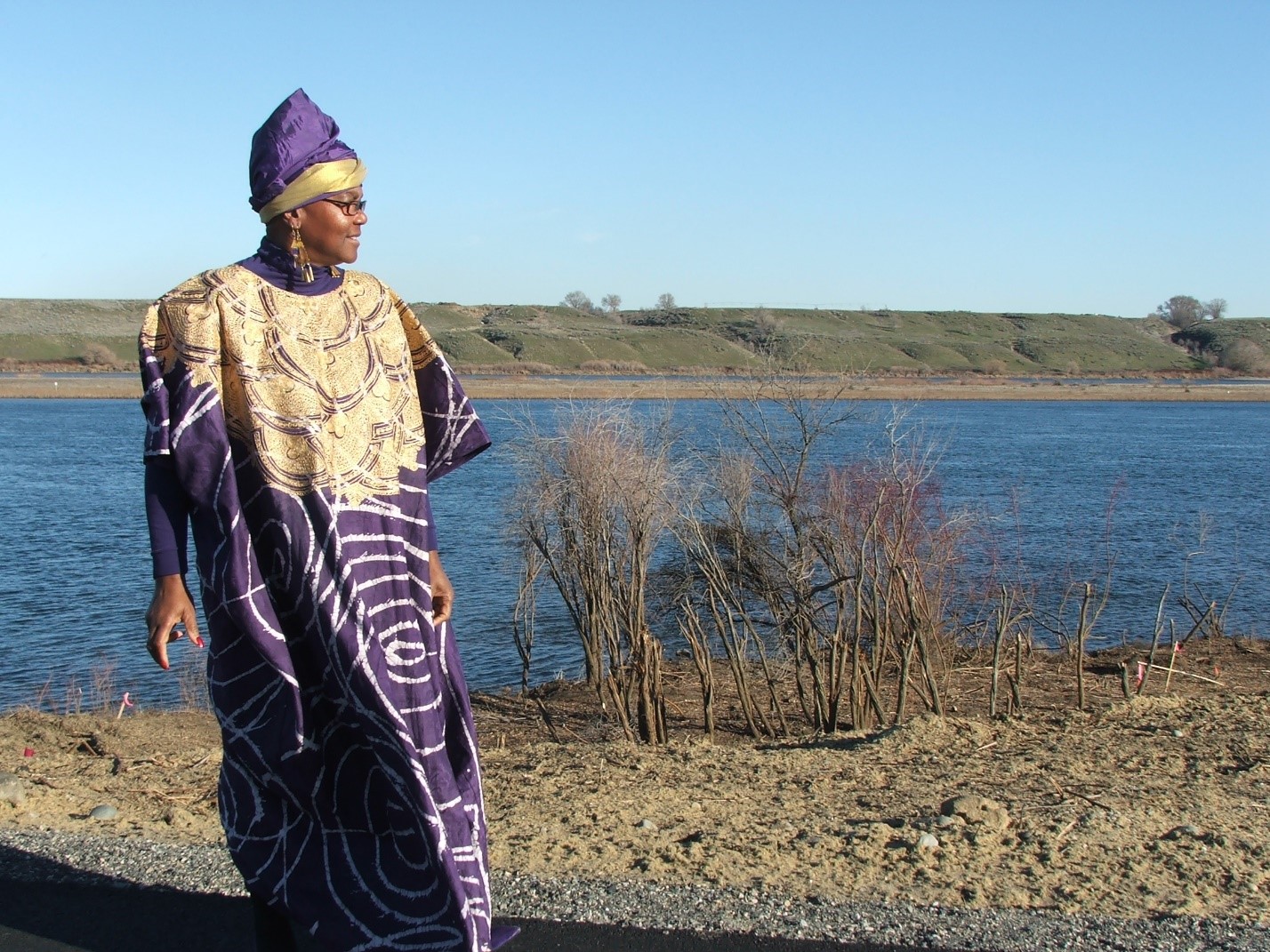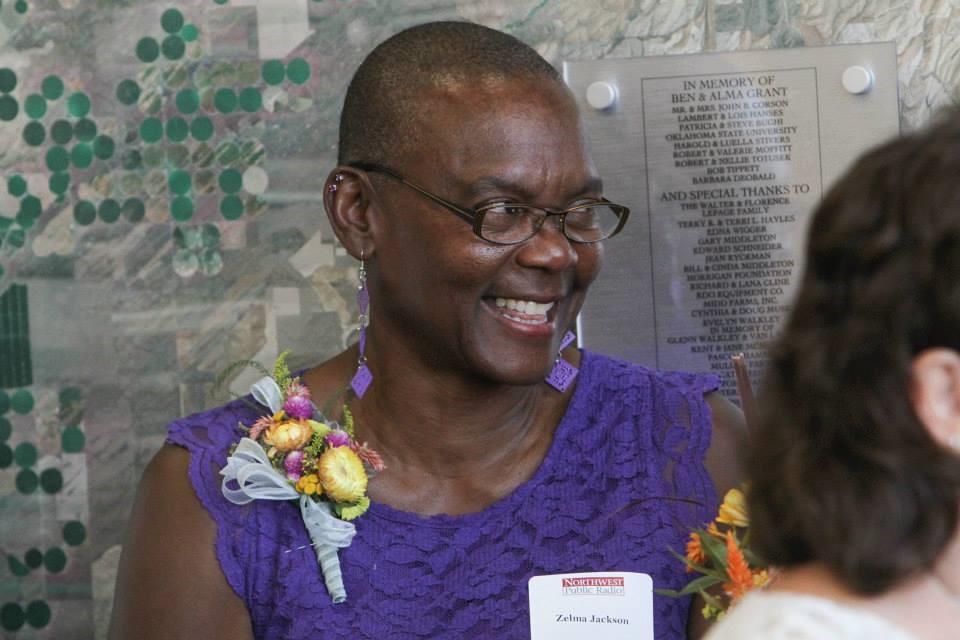
Zelma Maine Jackson spent 25 years working for our agency's Nuclear Waste Program.
As we wrap up our year-long focus on Ecology's 50th anniversary, we shine a spotlight on Zelma Maine Jackson. As a newly minted geologist in the 1970s, she had no peers. Almost literally.
At that time, there were few women geologists in the oil and gas industry — and even fewer, if any, women of color.
It would be nice to say that Jackson sailed smoothly into her career, immediately commanding the respect and admiration she enjoys today. The truth is that she faced skepticism and adversity along the way, especially in the early years.
One of her first assignments was as a well-side geologist on a petroleum drilling rig near Albuquerque, New Mexico. Her job was to assess core samples as the bit descended, making the call on whether it was likely to become a viable hole. Sleeping in a truck to babysit the arduous and dangerous work of wildcatting for oil and reviewing the muddy mess layer by layer as it came up.
Let's just say that the crew of hardened roughnecks didn't respond graciously to a young black woman telling them what to do. It may have been the first — but it wasn't the last — time she had to endure racial epithets and other indignities from field workers who resented and resisted her presence.
Standing her ground
Jackson didn't back down. No surprise to anyone who knows her. She reported the situation and asked for guidance. Within a day or two, a helicopter landed near the rig, and the CEO of Atlantic Richfield, the company drilling the well, got out. He fired the crew, which had been working on contract, on the spot, and shut down the operation.
Zelma Maine Jackson
“Word got around," Jackson said with a wry smile. “That was a turning point."
There's very little of the conventional in Jackson's background. She was born in South Carolina, a member of the Gullah or Geechee community of former slaves who forged their own cultural identity as forced immigrants to the American South. She learned those traditional ways from her grandmother, Hannah. How to behave, how to understand and respect the natural environment. To see herself as part of one big, inclusive world.
But by age 8 she was living in Heilbronn — near Stuttgart in Southern Germany — where her father was stationed in the U.S. military.
Rather than going to an American school, she was enrolled in a German school where, she said, “I caught on pretty well. They all spoke English, and they treated me as an equal."
She still speaks fluent German, a skill she used in recent years to introduce herself to the City of Kennewick's commission on diversity, which she chaired. That helped break the ice and set the tone for the commission's members to reveal their own personal, diverse backgrounds, and interests.
In her German schools, she was placed on the university academic track, where she was exposed to more advanced math and science — starting calculus, for example, at age 10.
Disappointment of Olympic proportions
Germany also was the site of one of Jackson's early disappointments. She was a fast runner — fast enough to catch the attention of German coaches, who began preparing her to run in the Olympics on a German relay team. But her dad was reassigned back to the U.S., and he wouldn't agree to let her stay behind. So she missed her chance for Olympic glory.
Back in New Jersey, she continued her interests in math and science, and soon gravitated to geology and Earth science. But she remained interested in athletics, and when she found that her school did not field a girls' basketball team, she organized one herself. She remembers the team — made up largely of girls from local housing projects — walking 15 miles to compete in a tournament, because they had no other way to get there. They won, by the way.
Her next stop was Virginia State University, a historically black college near Richmond. There, she fell under the tutelage of Dr. Mack Gipson Jr., the first African-American to earn a doctorate in geology. In addition to his academic career, Gipson worked for many years in the resources exploration industry, which is where Jackson set her sights.
As she got ready to launch her career, a group of oil companies — Exxon, Mobil, Shell — said they wanted to address the dearth of African-American geologists by helping to break down barriers.
“They didn't trust that we'd be treated fairly," she said.
On to Hanford
That led to her first job — exploring for uranium in the Rocky Mountain west. She went from there to well-side geology, then landed at Hanford reading test hole core samples for the Basalt Waste Isolation Project. That was one of several exploratory projects around the country searching for a suitable location for long-term storage of the nation's high-level radioactive waste.
She enjoyed the work, and learning about the Hanford area's geology — its thousands of feet of volcanic basalt topped by layers of sand and silt blown in on the winds and deposited by a succession of catastrophic floods descending from glacial Lake Missoula.
But, again, Jackson had to deal with racial and gender discrimination from co-workers. Eventually, it became so uncomfortable she decided to leave the field — and geology — altogether.
For the next decade or so, she worked in community involvement, helping with a women's shelter, the United Way, and other community action projects. During part of that time, she worked with Dan Silver for Gov. Booth Gardner, a strong proponent of environmental protection and cleanup.
Back to geology – and Ecology
Silver, who eventually became an assistant director of Ecology, coaxed Jackson out of geological retirement to work in the fledgling Nuclear Waste Program, helping to oversee the Hanford cleanup.
One of her early assignments was as a section manager, but she spent most of the next 25 years tending to test wells on Hanford's central plateau. Also known as the 200 Area, that's where the big plutonium processing facilities resided, along with the many kinds of repositories for the toxic and radioactive waste that processing generated.
“We covered most of the plateau, logging thousands of feet of core," she said.
She examined the cores in the field, recording her findings. The goal was to characterize the lithography, identify the subsurface formations, define the varying depths to the underlying basalt and, most important, determine where and how fast groundwater flows in different areas of the site. That information has been critical to understanding, tracking and treating contaminants that leaked into or were directly dumped onto the ground from hundreds, if not thousands, of sources across Hanford.
“In those years, we've systematically moved away from exploration to mining data," she said. “Always looking for the best routes to deal with the contamination."
What's her sense of the progress so far?
“We've made some strides," she said. “But it's been slow. For one thing, the contractors doing the work change over time. The new ones interpret the data and the mandate differently, and that can slow things down."
But she's proud of the work she's done, and of the work done by the program.
“Ecology is doing its job. It's fulfilling its mandate of maintaining a strategic plan to clean up Hanford."
The future's in good hands
She's one of a number of program employees who have retired or are reaching retirement age, but she's optimistic for the future.
“We have some sharp young folks who are bringing new enthusiasm and a fresh perspective to the work," Jackson said. “We've come a long way. I was once a pioneer. Now I'm proud to see that there are young workers of all diverse backgrounds in the program."
Jackson spends much of her retirement time at her place along the South Carolina coast, getting back to her roots in the heart of Gullah country. But she has a son, a granddaughter and a great-grandson living in the Richland area, so she spends a fair amount of time there, too.
She hasn't completely hung up her geology spurs. She expects to get involved as a citizen advocate in the Savannah River site cleanup. Savannah River was a sister site to Hanford, processing fuel for the nation's nuclear weapons arsenal.
Finally, she continues her decades-long advocacy to clear the path for more young people of diverse backgrounds to choose science and professional career paths.
Throughout the last year, we marked our agency’s 50th anniversary with stories on how Washington state’s commitment to environmental protection has developed, and the results that commitment has achieved.


